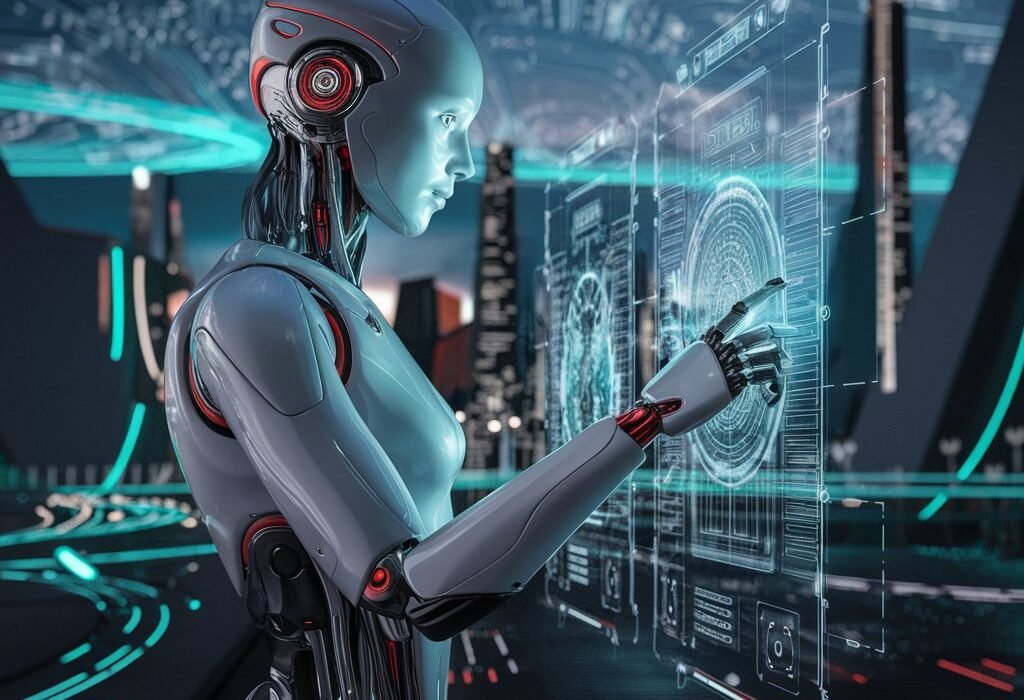AI, or artificial intelligence is revolutionizing the world in extraordinary ways. It has transformed our communication methods and brought automation to countless industries. The potential for growth and advancement seems limitless with AI. As we delve deeper into its capabilities, we realize how profoundly it affects our lives.
From analyzing personal data to generating innovative products and services, AI is a true game changer. Artificial intelligence has the power to reshape both our lifestyles and professional endeavors.
The Power of Artificial Intelligence
AI has revolutionized industries across the board, bringing about transformative changes that were once only possible with human intelligence. Tasks like problem-solving, decision-making, and pattern recognition are now efficiently performed by machines. Sectors spanning healthcare, finance, logistics, and marketing have all experienced the positive impact of AI adoption. This technological advancement has led to improved decision-making processes, lowered costs, and enhanced operational efficiency.
Artificial Intelligence Learning
Artificial intelligence learning, a subset of AI, enables machines to acquire knowledge and improve performance continuously. This process involves algorithms analyzing vast amounts of data, detecting patterns, and making informed decisions. There are three primary types of AI learning:
Supervised Learning
In supervised learning, algorithms are provided with labeled training data. They learn to make decisions based on the existing labels, aiming to develop a model capable of generalizing these associations and making accurate predictions on new, unseen data.
Unsupervised Learning
Unsupervised learning is a powerful technique that allows machines to identify patterns and structures without any prior knowledge of the data labels. By exploring inherent relationships and structures within the input data, it enables machines to group or classify data based on similarities and differences.
Reinforcement Learning
Reinforcement learning is a process in which agents learn to make decisions within an environment that has a system of rewards and punishments. The agent explores different actions and gradually enhances its decision-making abilities to maximize the overall rewards it receives.
Artificial General Intelligence
Artificial general intelligence, commonly referred to as AGI or “strong AI,” encompasses AI systems that possess a level of intelligence comparable to human beings. Unlike specialized AI, which is designed for specific tasks or fields, AGI exhibits the ability to comprehend, learn, perceive, and reason across diverse domains. It represents a significant advancement in machine cognition and has the potential to surpass limitations imposed by narrow applications of artificial intelligence.
Artificial General Intelligence Definition
An artificial general intelligence definition emphasizes the ability of AGI to independently complete any intellectual task that is equivalent to human cognitive capacity. In contrast to narrow AI or specialized AI systems that are designed for specific tasks, AGI strives to imitate cognitive abilities resembling those of humans.
Artificial General Intelligence Examples
Although AGI remains a distant concept, certain endeavors, including OpenAI’s GPT-3 and DeepMind’s AlphaGo, demonstrate remarkable aptitude for learning and problem-solving. These projects offer glimpses of the potential future developments in AGI.
GPT-3
GPT-3, developed by OpenAI, is a remarkable AI model renowned for its proficiency in natural language processing. With its advanced capabilities in comprehension and generation, it displays an extraordinary understanding of context and possesses the ability to produce responses that are strikingly similar to human-generated content. Moreover, GPT-3 showcases unparalleled expertise across various language-related tasks, including question-ans
AlphaGo
DeepMind’s AlphaGo captured global attention when it emerged victorious against world champion Go players. Through the utilization of deep reinforcement learning, AlphaGo demonstrated its ability to master the highly intricate game by effectively learning and strategizing amidst a vast array of possibilities.
Impact of Artificial Intelligence on the World
The impact of AI on the world is enormous, reshaping our daily lives and revolutionizing businesses. Scientific research has also been accelerated thanks to AI. Groundbreaking applications like virtual assistants, image and speech recognition, and personalized recommendations have become ubiquitous in modern society. Additionally, AI integration into manufacturing, robotics, and public safety is creating new opportunities and driving innovations.
Influence of AI on The Business World
One of the most noticeable impacts of AI can be observed in the business world. Companies are embracing AI to conduct market research, analyze data, tailor advertising campaigns, automate processes, manage customer relationships, and much more. Consequently, businesses experience faster and more informed decision-making based on data-driven insights. Moreover, they enjoy enhanced operational efficiency, leading to increased profitability.
Let’s further consider how AI is impacting various industries:
AI in Healthcare
Artificial Intelligence’s role in healthcare is expanding rapidly as it plays a crucial part in diagnostics, risk prediction, patient monitoring and care, drug discovery, and surgical procedures. For example, AI or AI-powered systems utilize advanced algorithms to analyze medical images and genetic data. This analysis helps detect anomalies, disease markers, and even predict patients’ likelihood of developing specific illnesses. The integration of AI in healthcare not only alleviates the workload on healthcare professionals but also promises timely and personalized care for patients.
AI in Agriculture
AI has found its place in agriculture, revolutionizing the industry with precision farming techniques, predictive analytics, crop monitoring, pest control, and yield optimization strategies. Through advanced algorithms, AI analyzes climate data to predict weather patterns and monitors crop health. It even takes charge of autonomous farm equipment for enhanced productivity. As a result, farmers witness increased crop yields, reduced wastage, and more sustainable farming practices.
AI in Finance
The finance industry heavily depends on artificial intelligence (AI) for various important functions. These include risk management, fraud prevention, investment predictions, customer support, and algorithmic trading. AI learning empowers systems to identify suspicious activities, automate trading decisions, provide personalized financial advice, and enhance the accuracy of credit scoring.
AI in Transportation
AI advancements in transportation have revolutionized various aspects, including the emergence of autonomous vehicles, improved traffic forecasting and route planning, and more efficient logistics. Take self-driving cars as a prime example, as they heavily rely on AI algorithms to maneuver through dynamic road environments, make real-time decisions, and enhance safety while providing unparalleled convenience. The integration of AI technologies aims to optimize transportation systems by boosting efficiency across the board.
AI is widely utilized for traffic predictions and route forecasting. For instance, it can analyze historical data and real-time traffic conditions using machine learning algorithms to determine the optimal travel time between two points on a map.
Artificial General Intelligence The Future
AGI holds immense potential in revolutionizing scientific research, problem-solving, decision-making, and creativity on an unprecedented scale. It possesses the capability to comprehend vast datasets and swiftly provide solutions to intricate problems. However, amidst the profound optimism surrounding AGI’s future prospects, it also elicits crucial considerations pertaining to ethics, safety, and regulation.

